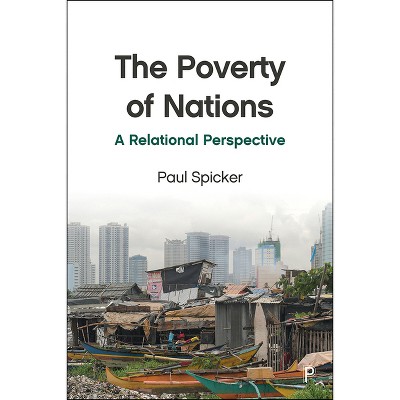The Wealth of Cities and the Poverty of Nations - (Economic Transformations) by Christof Parnreiter (Paperback)

$35.00 when purchased online
Target Online store #3991
About this item
Highlights
- Cities are seen as essentially "good" innovative, pro-growth, poverty-reducing.
- About the Author: Christof Parnreiter is Professor of Economic Geography at the University of Hamburg and an Associate Director of the Globalization and World Cities Research Network.
- 160 Pages
- Social Science, Regional Studies
- Series Name: Economic Transformations
Description
About the Book
A corrective to the view that cities are only ever "good", arguing that the same urban properties which make cities so extraordinarily proficient at producing the "good" innovations also provides fertile ground for the development of the "bad" ones, on which urban elites have syphoned off wealth from other localities and regions.Book Synopsis
Cities are seen as essentially "good" innovative, pro-growth, poverty-reducing. In a challenging corrective to this common portrayal, Christof Parnreiter argues that the same urban properties which make cities so extraordinarily proficient at producing the "good" innovations - agglomeration economies, network externalities and a massive built environment - also provides fertile ground for the development of the "bad" ones, on which urban elites have syphoned off wealth from other localities and regions.
The book scrutinizes the interconnections between wealth creation and poverty generation by putting cities centre stage as a fundamental explanatory category for understanding how the wealth of nations is produced as well as for grasping how the poverty of nations is created. It seeks to correct the developmentalist enthusiasm, commonplace in urban and regional studies, for cities' efficiency, which has displaced interest in cities' role in uneven development.Review Quotes
"Warmly recommended to anyone interested in a theoretically sound, critical understanding of the role of cities in capitalism... Christof Parnreiter questions the triumphalist claims that cities bring universal prosperity and are the solution to just about every problem... yes, cities generate innovation and wealth. But they only do so because they are, as the command centers of global capitalism, also the places of (the organization of) exploitation and over-exploitation- not only within the city, but also in the urban-rural relationship as well as along the global urban hierarchy.--Bernd Belina, Geographica Helvetica
A timely and refreshing account recalibrating the theoretical debate about cities and (uneven) development... a must read... clearly structured, well argued, not overly long, and well written... it deserves praise for offering important theoretical advancements about why and how cities can become the preferred sites for the organization of capitalist exploitation of nonelite inhabitants... a great resource for academics, students, and all those interested in urban theory more widely.--David Bassens, AAG Review of Books
The main objective of this book is to rebalance our understanding of cities... Parnreiter offers a rich, varied and cogent discussion that touches on the transition from feudalism to capitalism, the ideas of Adam Smith and Karl Marx, the world-systems thinking of Fernand Braudel, André Gunder Frank and Immanuel Wallerstein, and much more... The book is well-written and well-structured, and can be used as both a concise compendium of critical concepts and a standalone contribution to the literature... it deserves to be widely read.--Ben Derudder, Regional Studies
Cities are inherently complex. The development of cities never creates simple outcomes. These truisms are often missing from recent studies of contemporary urbanization. Parnreiter provides a convincing, and very necessary, corrective to laudatory promotions of cities today.--Peter J. Taylor, Director of Globalisation and World Cities (GaWC) research network
Just as the idea of the "triumph" of the city and the driving force of agglomeration economies has become hegemonic, Christof Parnreiter reminds us of the important counterpoint of the city's dark side. This is required reading for those that want to know what the "urban age" is really about.--Michiel van Meeteren, Assistant Professor in Human Geography, Utrecht University
Parnreiter presents an urgent corrective lens to pierce the proliferating facades of urban recreation to reveal the grim state of nations. Whether this is caused by cities is a question Parnreiter explores. This vista should inform the nascent discourse about making new cities that are neither shanty towns nor gleaming bunkers.--Saskia Sassen, Robert S. Lynd Professor of Sociology, Columbia University
About the Author
Christof Parnreiter is Professor of Economic Geography at the University of Hamburg and an Associate Director of the Globalization and World Cities Research Network. His books include Global City Makers (2018) (with Michael Hoyler and Allan Watson).Dimensions (Overall): 9.1 Inches (H) x 6.0 Inches (W) x .5 Inches (D)
Weight: .55 Pounds
Suggested Age: 22 Years and Up
Number of Pages: 160
Genre: Social Science
Sub-Genre: Regional Studies
Series Title: Economic Transformations
Publisher: Agenda Publishing
Format: Paperback
Author: Christof Parnreiter
Language: English
Street Date: November 26, 2024
TCIN: 90641879
UPC: 9781788215596
Item Number (DPCI): 247-36-7720
Origin: Made in the USA or Imported
If the item details above aren’t accurate or complete, we want to know about it.
Shipping details
Estimated ship dimensions: 0.5 inches length x 6 inches width x 9.1 inches height
Estimated ship weight: 0.55 pounds
We regret that this item cannot be shipped to PO Boxes.
This item cannot be shipped to the following locations: American Samoa (see also separate entry under AS), Guam (see also separate entry under GU), Northern Mariana Islands, Puerto Rico (see also separate entry under PR), United States Minor Outlying Islands, Virgin Islands, U.S., APO/FPO
Return details
This item can be returned to any Target store or Target.com.
This item must be returned within 90 days of the date it was purchased in store, shipped, delivered by a Shipt shopper, or made ready for pickup.
See the return policy for complete information.






